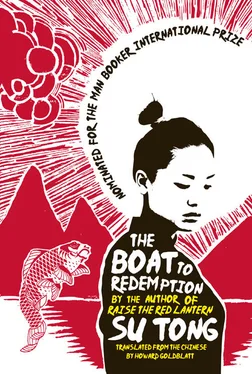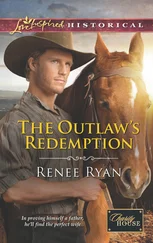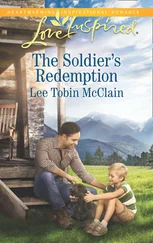‘That is where men play Chinese chess,’ a man said, pointing southwest to a six-sided pavilion. ‘What business does a woman have there? Do you play?’
She patted the basket on her back. ‘Me, play chess? No, the baby’s father is watching the Chess King play, and I’ve come for him.’
Deng Shaoxiang stepped into the pavilion, where two men in long robes were in the middle of a game. One, a police commander in disguise, had a cultured look, exactly what she’d expected of the Chess King. The other, a fair-skinned, keen-eyed man wearing glasses, was peering around. Not knowing which of the two was her contact, she fixed her gaze on the chessboard and uttered the secret phrase: ‘It’s going to rain. Time to come home and bring in the corn.’
One of the men looked into the sky; the other coolly sized up Deng Shaoxiang, picked up a chess piece and placed it on his opponent’s square. ‘The corn is in already,’ he said. ‘Now it’s time to take his general!’
Though the secret phrase had been answered correctly, Deng Shaoxiang did not put down her basket. Seeing the chaotic setup on the board, she suspected that the men did not in fact know how to play. ‘How will you do that?’ she asked guardedly.
Momentarily stumped for a reply, the police commander glanced at the other man, forcing himself to remain calm, and said, ‘Yes, how will you do that? Tell me.’
The second man gave Deng a sideways glance, his mind racing. ‘Remove the chariot and jump on the steed,’ he said. ‘But the cannon, ah, what to do with that?’ As he spoke, he let his gaze travel downwards, a salacious glint in his eyes. Then he burst out laughing. ‘You are very clever, Coffin Girl, but do you know what the cannon is doing? It’s aimed at you!’
Deng blanched and began edging her way out of the pavilion. ‘All right,’ she said, ‘do what you want. I shouldn’t have spoken. Who am I, a woman, to comment on how men play chess?’
But it was too late, for a gang of men sitting outside the tea shop across the way rushed over, as if attacking an enemy bastion. Deng stopped at the pavilion steps, seeing that she was surrounded, and stood still. ‘Well, well,’ she said. ‘So many men to deal with a single woman. You should be ashamed of yourselves.’ Her calm demeanour in the face of danger stunned them all. But her concern about her appearance nearly cost her her life on the spot. Seeing her reach into her bundle, the nervous policemen drew their weapons. But what she took out was a compact — she opened it, looked into the tiny mirror and began to powder her face. ‘ I’m not worried,’ she said. ‘So why should you be? All I ask is for a few moments to powder my face before you kill me. Too bad I don’t know how to use the weapons I’ve brought. If I did, I’d at least take one of you with me.’
Stung by the rebuke, a policeman ran up and snatched the compact out of her hand. So she reached back into her bundle and took out a comb. That too was taken from her. Then they took her basket. ‘Hold on,’ she said as she ran after it. ‘You’ll scare my baby!’ Pushing her way past the policeman, she bent down to kiss the baby in the basket. ‘All right,’ she said. ‘If you won’t let me comb my hair, then I’m ready. You can shoot me now.’
With a sneer, the commander said, ‘What do you take us for, a bunch of empty coffins, telling us what we can and can’t do? First you smuggle guns, then you tell us to shoot you. Well, you’re not getting off that easily.’ He signalled to a man outside the pavilion, who ran up with a pole and banged it against an overhead beam, knocking down a cloud of dust and a rope. A noose dangled from the end. With hideous grins, the men clapped their hands.
Momentarily taken aback, Deng Shaoxiang gazed at the beam and at the rope swaying in the autumn breeze like a ghostly pendulum. Those who heard her last words would remember them all their lives. ‘So instead of shooting me, you’re going to hang me, is that it? Go ahead if that’s what you want. All I ask is that you don’t leave me with my tongue hanging out. That’s hideous. You have a pole. Well, if my tongue hangs out, push it back in.’
After the martyr’s death, the weapons hidden in the basket were removed. But what to do with the baby? Eventually someone — no one knows who — put the baby back into the basket, and someone else — also unknown — took it down to the river. Having heard that boat people were known for plucking children out of the river, he left the basket on the steps of the pier. But no boats came and there were no boat people to claim the child. What came was the water. The river rose that night and swept the mysterious basket from dry land.
Water carried Deng Shaoxiang’s legacy downriver, floating from wave to wave. People on the bank who ran after the nearly-new basket spotted a clump of water grasses, like a tow rope, carrying the basket along in fits and starts, disappearing and reappearing, as if warning off anyone who might try to catch it. Ultimately the basket floated to a spot near the town of Horsebridge. Tired from its travels, it twirled once or twice before falling into the net of Feng Four, a fisherman. Driven by curiosity, Feng reached into the net and scooped it up. Inside he discovered an infant who looked strangely like an immortal, naked but for clumps of grass draped across his yellow skin, which was dotted with beads of water. When he picked the boy up he heard the sound of sloshing water. And there, at the bottom of the basket, hidden beneath some gourds, was a large red carp, which flipped into the air before slipping beneath the surface of the river.
My father was once that boy in the relief sculpture on the back of the memorial stone. The person who scooped the basket out of the Golden Sparrow River, the fisherman Feng Four, lived for many years after Liberation, and it was he who pointed out my father in the Horsebridge orphanage. What he recognized after the passage of time was not the face of the mystical child, but the birthmark on his backside. Seven orphan boys, all about the same age, were brought into the sunlight by attendants and told to expose their backsides for inspection. Filled with the importance of his task, Feng Four walked back and forth behind the boys. After eliminating four who bore no resemblance, he painstakingly examined the green birthmarks on the backsides of the remaining three little boys, his hand held high, twitching nervously; everyone present held their breath in anxious anticipation. Finally his hand landed on the bottom of the tiniest and scrawniest of the three. ‘It’s this one,’ he said. ‘The one with a fish-shaped birthmark. It’s him, I know it is!’
Feng Four’s hand had spanked the bottom of my father, and that loud smack settled the question. From then on, everyone knew that dirty little Wenxuan, the boy no one cared for, was in reality the son of the martyr Deng Shaoxiang.
For years people said that the boy found amidst clumps of water grass and a red carp was the son of the martyred Deng Shaoxiang. But then everything changed. One year, a team of martyr-orphan investigators, shrouded in mystery, was sent by the district government to determine whether the orphan was in fact the martyr’s son. Taking up residence in Milltown, they travelled to towns and villages up and down the banks of the Golden Sparrow River, sometimes openly, at other times in secret. The starting point of their investigation was the disgraceful personal history of Feng Four, whose word they had determined was not to be trusted.
Who was this Feng Four, anyway? In his youth he’d been a river pirate, but when he gave up the lifestyle — or as the Chinese proverb goes, washed his hands in a golden basin — he built a hut on the riverbank and settled down to the life of a fisherman. People who lived near the river agreed that he’d been a handsome young man who’d lived a dissolute life, choosing to become a pirate because of a woman. With a boat and a rifle, he’d pursued an amorous woman who peddled garlic from her boat. Later he went ashore because of yet another woman. He’d had his eye on a farmer’s daughter who picked broad beans and gave herself to him in the field, but would not marry him. So he next turned his attention to a widowed seamstress in Horsebridge. She was happy to carry on a furtive affair, but not to live openly with him, and while she refused to marry him, she would not let him marry anyone else. In the end, he simply wove nets on the riverbank all day long, nets for catching both fish and women. A handsome, bold fellow who was favoured by the opposite sex, he caught more women than fish. One — it was never made clear who — passed on a venereal disease that not only forced him to keep his trousers buttoned from then on, but eventually ended his life.
Читать дальше












